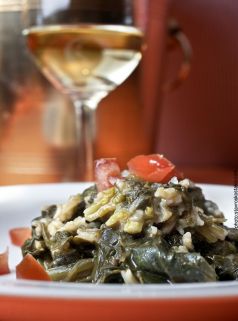Greek cooking is simple and healthy
Greek cooking is simple and healthy! While there are time-consuming dishes such moussaka and pastitsio, there are very few complicated sauces and preparations in Greek cooking. The Greek flavor palette (garlic-oregano-lemon juice trinity, tomato sauces perfumed with cinnamon and allspice, Greek honey in various sweet and savory dishes, orange and fennel combined, and more) often lends antioxidants, minerals and other nutritional elements to every meal. In the traditional Greek Diet, essentially a traditional Mediterranean Diet, vegetables and legumes appear in countless main course dishes. Most main course vegetable dishes provide the daily recommended allowance for vegetables in the diet. Coupled with whole grain bread and a little cheese (protein), these meals are nutritionally complete. The wealth of vegetable main courses evolved out of the fasting traditions that dictate one abstain from all animal products for roughly half the year. Today Greeks are avid meat consumers but traditionally meat was limited, consumed as a festive food or combined with plant-based foods in stews and baked dishes. Extra virgin Greek olive oil makes so much Greek food healthy and Greeks consume it in copious amounts, around 22 liters per person annually. Extra virgin Greek olive oil is the basic cooking fat and the basic dressing, poured over all manner of salads and cooked dishes at the end.



